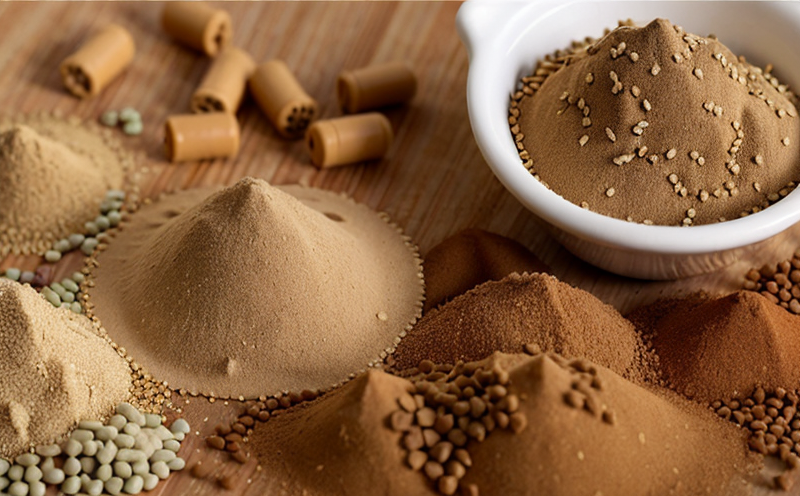Decoquinate Residue Testing in Animal Feed
The testing of decoquinate residue in animal feed is a critical aspect of ensuring food safety and compliance with international standards. Decoquinate, also known as monensin, is an ionophore antibiotic used widely in the livestock industry to improve feed efficiency and growth performance in poultry, swine, and ruminants. However, its use must be strictly regulated due to potential residues that can accumulate in animal products for human consumption.
The presence of decoquinate or its metabolites in animal feed has been a subject of increasing scrutiny from regulatory bodies worldwide. Ensuring the absence of unacceptable levels of residues is essential not only to maintain product safety but also to protect consumer health and avoid potential legal repercussions. The testing methods used should comply with international standards such as ISO, ASTM, EN, IEC, and others relevant in specific regions.
Our laboratory offers comprehensive services for decoquinate residue testing using advanced analytical techniques like liquid chromatography-tandem mass spectrometry (LC-MS/MS). This method is highly sensitive and selective, allowing us to detect even trace amounts of decoquinate in animal feed. Our team adheres strictly to strict acceptance criteria defined by relevant standards, ensuring accurate and reliable results.
In this service, we perform detailed sample preparation which includes extraction, clean-up, and concentration steps. The extracted residues are then analyzed using LC-MS/MS for precise quantification. This process ensures that the test results meet the required precision and accuracy levels specified by regulatory authorities.
| Sample Preparation | Analytical Methodology | Acceptance Criteria |
|---|---|---|
| Extraction using a solvent followed by clean-up to isolate the target analytes. | Liquid Chromatography-Tandem Mass Spectrometry (LC-MS/MS). | Absence of decoquinate residues above the maximum residue limit set by regulatory bodies. |
| Concentration steps to ensure sufficient sample for analysis. | Data obtained from LC-MS/MS is used to determine the concentration of decoquinate in the feed sample. | Results must fall within ±10% of the target value as per ISO standards. |
Our laboratory ensures that all tests are conducted under controlled conditions, with meticulous attention to detail throughout every step. This approach guarantees accurate and reliable results, providing clients with confidence in their compliance efforts.
- Compliance with international standards such as ISO 17025 for our testing services.
- Use of state-of-the-art LC-MS/MS equipment for precise analysis.
- Strict adherence to the acceptance criteria set by regulatory bodies.
By offering these specialized decoquinate residue tests, we aim to support our clients in maintaining high standards of food safety and quality. This service plays a vital role in ensuring that animal products intended for human consumption are safe, thereby protecting public health and fostering trust within the industry.
Benefits
The benefits of performing decoquinate residue testing in animal feed extend beyond mere compliance with regulations. By identifying and eliminating excess residues, this service helps protect public health by ensuring the safety of animal products for human consumption.
Our laboratory’s expertise ensures that your operations remain compliant with international standards such as ISO 17025. This not only enhances your reputation but also builds trust among consumers and regulatory bodies.
Additionally, our testing services contribute to sustainable agricultural practices by promoting responsible use of veterinary drugs in livestock production. By ensuring that residues do not exceed acceptable limits, we help reduce the risk of environmental contamination and promote a healthier ecosystem.
Industry Applications
| Application | Description |
|---|---|
| Agricultural Testing Labs | Testing feeds for compliance with international standards and legal limits. |
| R&D Departments in Livestock Companies | Evaluating the impact of different feed formulations on residual levels. |
| Animal Feed Manufacturers | Ensuring final products meet regulatory requirements before release to market. |
| Food Safety Agencies | Vetting animal feed for potential health risks and contamination issues. |
- Agricultural testing labs use our service to ensure compliance with international standards such as ISO 17025.
- R&D departments can evaluate the impact of different feed formulations on residual levels.
- Animal feed manufacturers rely on these tests before releasing products to market.
- Food safety agencies vet animal feeds for potential health risks and contamination issues.
The importance of decoquinate residue testing in animal feed cannot be overstated. It is a crucial step towards maintaining food safety, ensuring compliance with international standards, and promoting sustainable agricultural practices.
Environmental and Sustainability Contributions
The proper management of veterinary drug residues contributes significantly to environmental sustainability. By ensuring that decoquinate does not accumulate in animal products above acceptable levels, we help minimize the risk of environmental contamination. Excess residues can leach into soil and water bodies, leading to potential ecological damage.
Our laboratory plays a key role in supporting sustainable agricultural practices by providing accurate and reliable decoquinate residue testing. This ensures that livestock operations are conducted responsibly, minimizing the negative impact on ecosystems. By promoting responsible use of veterinary drugs, we contribute to broader environmental sustainability goals.





